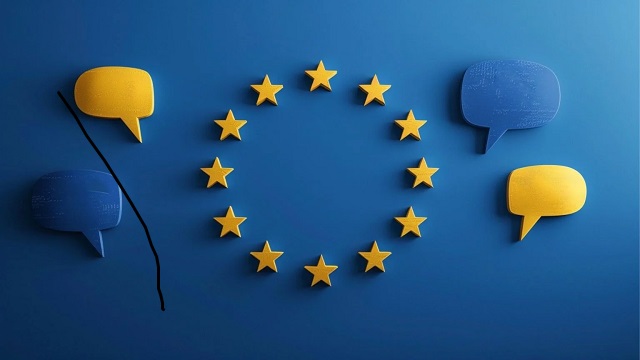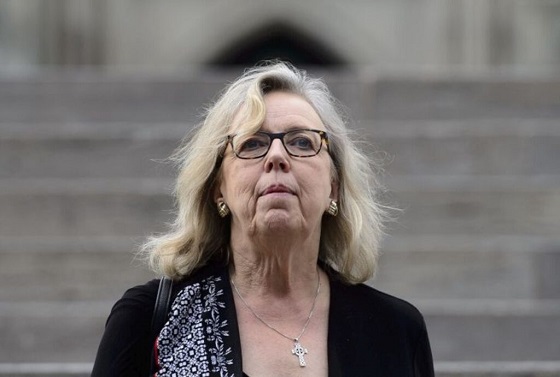Censorship Industrial Complex
Newly Released Documents Reveal Big Tech Limited Millions of Posts During EU Elections

From Reclaim The Net
|
Ah, elections—the pinnacle of democracy where the common folk cast their ballots and, ideally, choose their fate. But hold onto your hats, because behind the grandeur of the European Parliament elections this year lurked a very different sort of governance, one executed not in the open streets but in algorithmic backrooms. Welcome to the Age of Censorship-as-a-Service, brought to you by our ever-dependable friends at Meta, Google, and TikTok.
Meta’s Mission: Make the Truth More… Manageable
Let’s begin with Meta. In a move that feels like something out of a dystopian satire, Meta proudly announced they had reduced the reach of tens of millions of posts across Europe. They wielded over 150,000 Facebook fact-checking articles to de-escalate the virality of 30 million pieces of content.
According to Meta, this wasn’t censorship—no, it was a mere “scaling of the work of independent fact-checkers.” The way they tell it, this was all in the name of maintaining “informed and reliable discussions.” Ah, reliable discussions, where only pre-approved, EU-certified opinions are allowed to flow freely.
Of course, official government statements and the edicts from the holy temples of global health organizations were entirely exempt from Meta’s moderating fervor. After all, why impede the credibility of those who are never wrong—except, of course, when they are, but let’s not get hung up on inconvenient details like that.
On Instagram, another Meta product, this brave new moderation mission persisted. The platform used 39,000 fact-checking articles to put the brakes on nearly a million posts. That’s right—one million “potentially hazardous” thoughts and opinions that, for the good of humanity, needed a little algorithmic throttle. And if you were wondering, it wasn’t just the memes of conspiracy theorists—they made sure that you, your grandma, and that neighbor with too many political opinions got the message too: “Play nice, or we’ll see to it no one hears you.”
TikTok: Suppressing, But Make It Fashionable
Meta wasn’t the only digital nanny keeping Europeans in line. Over at TikTok, the playbook got even hazier. The platform took pride in admitting that it restricted misleading posts—though, unlike Meta, TikTok kept the numbers conveniently vague. You see, their strategy was more about “awareness,” guiding content creators with a gentle algorithmic shove away from the tempting edges of disinformation. How thoughtful.
As if to prove their dedication to curated reality, TikTok also pointed Irish users in the direction of fact-checks from TheJournal.ie, an outlet that coincidentally receives EU funding. No conflict of interest there, right? Just an honest effort to “raise awareness.” And while TikTok didn’t offer up the numbers, we can be assured that plenty of thumbs danced across phone screens only to find their intended messages conveniently dulled down or disappeared.
Google: Where Terms of Service Are Optional
And then we have Google, that beacon of a supposedly neutral search engine—except when it isn’t. Reports show that YouTube, under Google’s magnanimous ownership, automatically deboosted videos that complied with their very own terms of service. Yes, you read that right. Even when content passed muster by their own rulebook, some unseen hand deemed it “unworthy.” Google tells us this was to curb the spread of misinformation. A noble aim, except for that pesky issue of who gets to decide what counts as misinformation—and why.
Critics, like Tom Vandendriessche, an MEP for Patriots for Europe, have not been fooled by the big, earnest proclamations of “integrity protection.”
Vandendriessche—whose party has fought and won against Big Tech’s silencing efforts—paints a stark picture of unchecked power: tech companies with unprecedented influence, deciding who gets heard and who doesn’t.
“This could lead to an era of ‘techno-communism,'” Vandendriessche argued to Brussels Signal, where an unelected cabal decides what constitutes reality for the rest of us. A “techno-communism” where, if your thoughts don’t align with the given narrative, they might as well not exist.
It’s not like Vandendriessche is shouting into the void, either. His criticism comes backed by experience, his party having already tasted the bitter fruits of deplatforming. If a democratically elected official can’t even get his voice out there without tech giants intervening, what hope is there for the average citizen with an inconvenient truth?
The EU’s Seal of Approval: Trust Us, We’re Here to Help
But let’s not forget the EU brass, who are, predictably, patting Big Tech on the back. Věra Jourová seems to believe they’ve stumbled onto some grand new way to “protect the integrity of elections.” Their stance on Big Tech’s secretive influence campaign was remarkably sunny—because nothing says “protecting democracy” like a few ultra-rich corporations quietly deciding what can or cannot be said during election season.
What’s fascinating is the conviction with which the EU spins this story. They genuinely believe—or want us to believe—that this centralized control is for our benefit, a way to combat the terrifying specter of “disinformation.” Clearly, the best way to fight misinformation is to silence millions of voices, all while exempting the officials and organizations whose statements are apparently beyond reproach. Trust us, they say: We’re only limiting the information you receive for your own good.
|
|
|
|
Since you’re here, it’s clear you value Reclaim The Net. Today, we’re inviting you to become a paid supporter. Although we rely on contributions, only a fraction of our readers—less than 0.2%—choose to contribute.
By becoming a supporter today, you can ensure Reclaim The Net thrives for years to come. There’s no requirement for ongoing support; you can control or cancel your yearly support from inside your own account without needing to get in touch.
Please take a moment to become a supporter of Reclaim The Net and get all of the extra benefits as a thanks.
|
Censorship Industrial Complex
Justice Centre campaigning Canadian provinces to follow Alberta’s lead protecting professionals

Justice Centre launches national campaign to stop ideological overreach in regulated professions
The Justice Centre for Constitutional Freedoms announces the launch of a national campaign urging all provinces to adopt legislation that restores professional regulators to their proper role of overseeing competence and ethics, rather than compelling speech or imposing political ideology on regulated professionals who serve the public.
Across Canada, professionals such as doctors, nurses, teachers, social workers, engineers, dentists, lawyers and many others are governed by regulatory bodies created to uphold technical competence and ethical standards. Instead of focusing on those core responsibilities, however, many regulators have begun embedding political or ideological content into mandatory courses, codes of ethics and continuing education requirements.
At the same time, professionals are increasingly being investigated or disciplined not for misconduct, but for expressing personal views or declining to endorse political positions.
To help Canadians take action, the Justice Centre has created an online tool with a ready-to-send letter that goes directly to the provincial representatives responsible for the relevant legislation. All the user needs to do is select their province and enter their information, and the tool automatically delivers the letter to the appropriate recipient.
The prepared letter outlines three essential legislative amendments:
- prohibiting regulatory bodies from pursuing political objectives;
- prohibiting regulators from monitoring or controlling the speech of their members; and
- prohibiting regulators from embedding political or ideological content into definitions of competence and ethics.
Alberta is the first province to take meaningful steps toward addressing this growing problem. Its proposed legislation, called the Regulated Professions Amendment Act, is designed to prevent regulators from compelling speech, advancing political objectives or embedding ideology into definitions of competence and ethics.
The Justice Centre encourages all Canadians to visit our website today to take action and help protect the independence of regulated professionals.
Censorship Industrial Complex
Conservative MP Leslyn Lewis slams Liberal plan targeting religious exemption in hate speech bil

From LifeSiteNews
Bill C-9 is being called an attempt to criminalize sections of the Bible, Quran, Torah, and other sacred texts in Canada.
Canadian Conservative MP Leslyn Lewis blasted a federal government plan to criminalize parts of the Bible as an attack on “Christians,” warning it sets a “dangerous precedent” for Canadian society.
“The Liberal government has agreed to remove the religious exemption in their hate speech bill, C-9, to secure Bloc support and push this bill through Parliament,” Lewis wrote Tuesday on X.
“This is not a minor adjustment. This shift comes at the direct expense of Christians and other religious communities across Canada.”
As reported by LifeSiteNews, a government insider revealed that the Liberal government of Prime Minister Mark Carney plans to remove religious exemptions from Canada’s hate-speech laws by modifying a bill.
Bill C-9, the Combating Hate Act, as reported by LifeSiteNews, has been blasted by constitutional experts as allowing empowered police and the government to go after those it deems have violated a person’s “feelings” in a “hateful” way.
A recent media report states that the Carney Liberals and the separatist Bloc Québécois want to amend Bill C-9, which would “criminalize sections of the Bible, Quran, Torah, and other sacred texts,” Conservative leader Pierre Poilievre noted yesterday on X.
Lewis warned that “no government” should “ever negotiate away religious liberty in exchange for political support.”
“No party should decide which beliefs are acceptable and which ones carry criminal risk,” she warned.
She added that the Liberal government of Carney’s plan to amend Bill C-9 is a “dangerous precedent.”
“Religious freedom is not a political tool. It is a Charter right, a constitutional protection, and a cornerstone of our society,” she warned.
Poilievre blasted the Liberals’ plan as well, warning Liberal-Bloc amendments to C-9 will “criminalize sections of the Bible, Quran, Torah, and other sacred texts.”
“Conservatives will oppose this latest Liberal assault on freedom of expression and religion,” he noted on X earlier this week.
In response, the party launched a petition over fear that religious texts could be criminalized.
Liberal MP Marc Miller had said earlier in the year that certain passages of the Bible are “hateful” because of what it says about homosexuality and those who recite the passages should be jailed. As reported by LifeSiteNews, he was recently appointed as a government minister by Prime Minister Mark Carney.
-

 Energy12 hours ago
Energy12 hours agoA look inside the ‘floatel’ housing B.C.’s LNG workforce
-

 International1 day ago
International1 day agoFBI may have finally nabbed the Jan. 6 pipe bomber
-

 Energy2 days ago
Energy2 days agoCanada following Europe’s stumble by ignoring energy reality
-

 COVID-1920 hours ago
COVID-1920 hours agoUniversity of Colorado will pay $10 million to staff, students for trying to force them to take COVID shots
-

 Business2 days ago
Business2 days agoCanada’s climate agenda hit business hard but barely cut emissions
-

 espionage1 day ago
espionage1 day agoDigital messages reportedly allege Chinese police targeted dissident who died suspiciously near Vancouver
-

 Energy12 hours ago
Energy12 hours agoELZABETH MAY HAS IT WRONG: An Alberta to Prince Rupert Oil Pipeline Will Contribute to Greater Global Oil Tanker Safety
-

 Censorship Industrial Complex2 days ago
Censorship Industrial Complex2 days agoConservative MP Leslyn Lewis slams Liberal plan targeting religious exemption in hate speech bil



